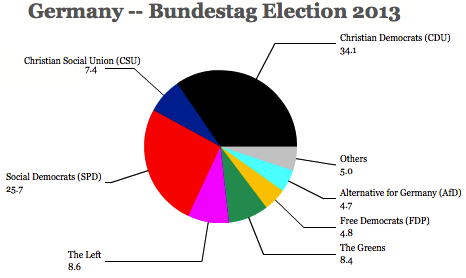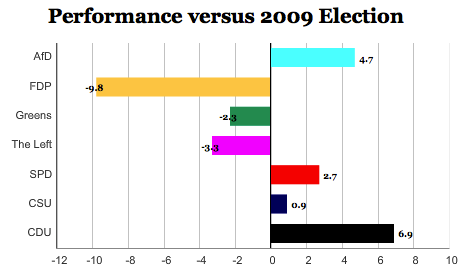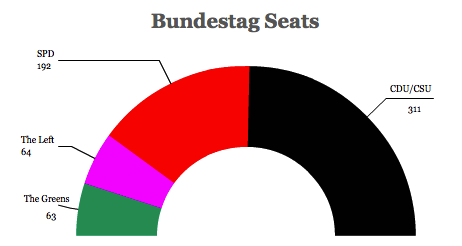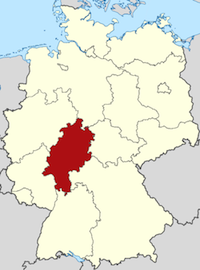Election officials released provisional results overnight in both the federal Germany election to determine the makeup of the lower house of Germany’s parliament, the Bundestag, and the Hessian state elections.![]()
![]()
Here’s where things stand in the total national ‘party vote’:
As predicted by exit polls earlier Sunday, neither the new eurosceptic party, the Alternative für Deutschland (AfD, Alternative for Germany) nor the longtime liberal Freie Demokratische Partei (FDP, Free Democratic Party) won more than 5% of the vote — meaning that they have not won any seats in the Bundestag.
The final total won by chancellor Angela Merkel’s Christlich Demokratische Union Deutschlands (CDU, Christian Democratic Party) — together with the Bavarian Christlich-Soziale Union in Bayern (CSU, the Christian Social Union) — comes to 41.5%. That’s exactly the same percentage that the CDU/CSU and chancellor Helmut Kohl won in the 1994 German elections, and it’s just 2.3% less than Kohl’s total in the 1990 elections, which came in the aftermath of the largely successful reunification of West Germany with East Germany. It’s an absolutely huge win for Merkel — but we already knew that as polls closed Sunday.
Here’s a look at how Sunday’s election result compared to the previous elections in September 2009:
There are no absolutely clear winners except the CDU/CSU, which improved on its 2009 totals by a staggering 7.8% — including a nearly 1% improvement by the CSU (which is pretty incredible, given that the CSU seeks votes solely in Bavaria, home to just 12.5 million of Germany’s 80 million residents).
The FDP obviously had a disastrous result — the party’s worst result in Germany’s postwar history, which comes after its postwar high of 14.6% just four years ago. Both leading FDP figure and economics and technology minister Rainer Brüderle, party leader and vice chancellor Philipp Rösler and former party leader (until 2011) and foreign minister Guido Westerwelle are all likely to step aside from their top leadership positions.
The center-left Sozialdemokratische Partei Deutschlands (SPD, Social Democratic Party) improved slightly on its 2009 result, which was a postwar low for the party under chancellor candidate Frank-Walter Steinmeier, who served as foreign minister in the 2005-09 CDU/SPD ‘grand coalition’ government. But the SPD’s performance under its 2013 candidate Peer Steinbrück, who served as Merkel’s grand coalition finance minister, was its second-worst result in postwar German history.
Die Grünen (the Greens) also suffered a retreat from its 2009 totals and especially from polls in 2011 that showed them winning between 20% and 25% of the vote. The poor result follows an unfocused campaign with at least four different leaders. The Green platform swung from promoting ‘Veggie Day’ to advocating tax increases, despite the fact that its electorate is becoming more moderate, less radical, older and wealthier.
Die Linke (the Left) appears to have retained its traditional strength as the second-most popular party in the eastern states (second to Merkel’s CDU), but it has also lost support since 2009. Though its leaders were crowing that it will be the third-largest party in the Bundestag for the first time since reunification, the CDU appears to have made significant inroads into the Left’s eastern heartland.
Though the AfD had a superb performance, it obviously fell 0.3% short of entering the Bundestag and, while it will work hard to retain relevance in next spring’s European elections, it’s difficult to tell if it can retain and grow its strength between now and 2017.
Here’s the breakdown of the seats in the Bundestag — due to so-called ‘overhang seats’ resulting from the way in which additional seats are allocated to bring seat totals in line with the ‘party vote,’ there are 630 seats:
With 311 seats, Merkel is five seats short of an absolute majority. Without the option of her previous coalition partner, the FDP, it means that she has three options: Continue reading German election results — federal Bundestag and Hesse state results (in five charts)




